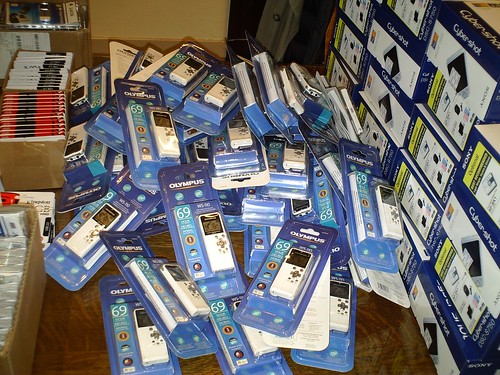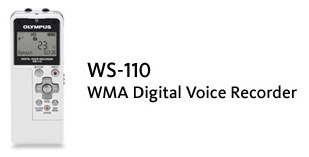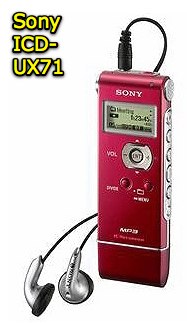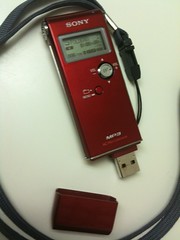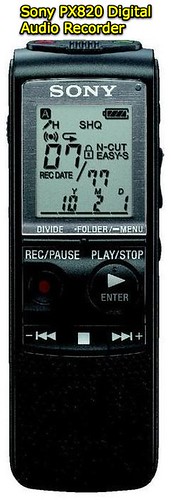In our 2.5 day oral history and digital storytelling workshops, Storychasers typically provides each participant with a “digital backpack” of equipment including a digital audio recorder, a headset with microphone, a digital camera, a USB flash drive, and a media SD card for the camera. Of these five items, the digital audio recorder is my favorite. I’m a big fan of podcasting and recorded audio, but also an advocate for simple yet powerful technologies which can be used transformatively. When you hold a videocamera in front of someone, personal interviews often “feel” different than ones in which you simply turn on a digital audio recorder, put it down on the table, and then forget about it while you have a conversation. In the spirit of Storycorps, Storychasers aspires to empower individuals to become digital archivists of their own family and community history. To this end, tools like digital audio recorders are essential in preserving history.
As you might guess, continual advancements in consumer electronics have meant the contents of our Storychasers “digital backpack” have continued to change with the times. In 2008, we started providing “digital backpacks” to participants and used the Olympus WS-110 Digital Recorder. With 256 MB of storage, it could record 17 hours of audio at its high quality setting and 69 hours in the lowest quality. It was battery operated with a single AAA battery, recorded in mono, and cost about $60. The main disadvantage of this recorder was its file format: WMA or Windows Media Audio. Because Audacity can’t directly import WMA files, we had to use the free program Switch to convert WMA into WAV or MP3 before editing recordings. This wasn’t a HUGE pain, since Switch is free, but it was a hurdle we’d prefer to avoid if possible. The Olympus WS-110 recorder at some point was discontinued, and is no longer available for purchase as a “new” item from retail outlets.
In 2009 Storychasers began using the Sony ICD-UX71 digital audio recorder. This recorder had 1 GB of storage (four times the Olympus 110) and could record 18 hours of high quality audio or 287 hours of lower fidelity “voice quality” audio. It was powered by a single AAA battery, like the Olympus 110, but most noteably could record directly in MP3 format. Using the Sony UX-71 meant in our workshops we no longer had to use or teach about Switch software. This was GREAT, and I loved using as well as teaching others how to use this recorder. This is still the primary mobile voice recorder I use today for podcasting. Throughout the time it was available for purchase, the Sony UX-71 recorders were available for around $85. This was more expensive than the Olympus, but the recorders offered stereo recording at higher fidelity / bit rates as well as the MP3 recording file format. At the time I thought this was well worth the money for our workshops.
In the last month or so, Sony has discontinued the UX-71 recorder and it’s not available from many retailers. Our Storychasers organization has snapped up a few remaining recorders from some online retailers, but we can no longer order them from CDW and the official Sony website indicates these recorders are no longer available from Sony. This predictable change in consumer electronic technologies has forced Storychasers again to look for the best replacement recorder for our workshop series. At this point we’ve found two, and the amazing thing is they are both available for sale at many WalMart stores. The fact we can buy these recorders at WalMart indicates (perhaps) these technologies are being commoditized to a greater extent. This is GOOD NEWS for educators, students, and champions of community oral history! Here are the two options we’re using this summer for our 12 remaining summer workshops as our supply of Sony UX-71 recorders is depleted.
The Sony ICD-PX820 digital audio recorder appears to be Sony’s best option to replace the UX-71. It is powered by two AAA batteries instead of one, and records in mono instead of stereo as the UX-71 did. It does record in MP3 format. Like the Olympus WS-110 and Sony UX-71, it has a built-in speaker for playback testing as well as 1/8″ headphone and external mic ports. All three recorders include a light to show if the device is recording or playing back audio. It retails for just $60, which is about $25 less than the UX-71. The biggest DISADVANTAGE of this recorder, however, is that it requires a SEPARATE USB cable to connect it to the computer. Both the Olympus WS-110 and Sony UX-71 had “USB direct” ports which let users DIRECTLY plug the devices into a computer. This is GREAT for classroom use, since it’s one less cable to keep track of with students. This is a photo of my own UX-71 recorder, with the USB port cover removed. (If you look closely you might see some rust marks. A few months ago, I actually left the recorder in the pocket of my shorts and it got washed in our family washing machine. Amazingly it still works fine. Now THAT’S durability!)
This is a photo of the (relatively) new Sony PX-820 digital audio recorder. Its 2 GB of capacity means it can record 535 hours of audio in its lowest quality setting. Sony does offer a 1 GB PX-720 model, but it’s not advertised as being compatible with both Apple/Macintosh computers as well as Windows-based PCs. Cross platform compatibility is a non-negotiable requirement for our Storychasers workshops, so that rules out the 720 for us. Some US WalMart stores are selling both the PX-720 and PX-820 models for $60 currently.
While I generally love Sony products and have especially loved their UX-71 recorder, I’m not entirely thrilled with the PX-820. It’s already a hassle for educators in our Storychasers digital storytelling workshops to manage cables for their digital camera and headsets. I don’t want to add another cable to the mix if it can be avoided. I’m also very interested in finding a capable digital audio recorder at a LOW PRICE. I’m glad the PX-820 is $60 instead of the $85 we’ve generally paid for the UX-71s, but that’s still too expensive.
For those reasons, I’m elated to report the RCA VR5220 appears to be “the digital recorder of choice” for remaining Storychaser workshops this summer. It is just $35, includes a flip-out USB connector (meaning a separate USB cable is NOT required) and runs on two AAA batteries. Unlike the Olympus and Sony models, it does NOT come with batteries, those have to be purchased separately. The price point and functionality of this recorder are FANTASTIC, however, and the lack of included batteries is a minor inconvenience. For direct compatibility with Audacity as well as Apple/Macintosh computers, the audio quality setting for the recorder needs to be changed to HQ / high quality. This changes the recording format from a proprietary RCA format (which is readable using provided Windows-only audio software) to the cross-platform WAV format. Its 512 MB size means it can record 20 hours in HQ/WAV format, which is plenty for our digital storytelling workshops as well as classroom use / home checkout-out. I’m VERY enthused about this digital audio recorder from RCA.
Today at our Celebrate Oklahoma Voices workshop in Tipton, our facilitator team tried out both the Sony PX-820 and RCA VR-5220. Our consensus was the RCA is the better recorder for Storychasers and educators specifically. It’s GREAT to not have to use a separate USB cable to plug it in: It just plugs directly into the computer. Even though the storage capacity (512 MB) and recording limit (20 hours in WAV format) are less than other recorders, it sounds and works GREAT. Although these recorders are for sale in many Oklahoma WalMart stores now (I found them in Edmond and Chickasha last night) it is not currently listed for sale on the WalMart website. Google Products currently lists 92 online resellers of the RCA VR-5220 recorder, so we hopefully won’t have trouble ordering these for our participant “digital backpacks” this summer.
What have your experiences been with digital audio recorders? Do you have a recommendation for an equally inexpensive ($20-$35) digital audio recorder with comparable features to the RCA VR-5220? The fact it’s cross-platform, imports directly into Audacity, is battery powered, and plugs DIRECTLY into a computer without the need for an extra cable are the features I think make it the most affordable and capable digital audio recorder on the market today. If there is a better choice, I’d love to know about it!
If you’d like to attend a Celebrate Oklahoma Voices digital Storytelling workshop, we have open slots available in six of our remaining twelve workshops this summer around the state. The online sign-up for our first “Celebrate Kansas Voices” workshop August 4-6 in Manhattan will go online later this week. Anyone is welcome to join both the Celebrate Kansas Voices and Celebrate Oklahoma Voices learning communities, both built with Ning. We have 577 videos currently on Celebrate Oklahoma Voices, created in the past three years by Oklahoma teachers and students. After this week in Tipton (incidentally one of our 19 ARRA-funded 1:1 schools) our video count should exceed 600!
Technorati Tags:
audio, digital, storychasers, recorder, sony, rca, olympus, ws110, ws-110, ux71, ux-71, px820, px-820, px720, px-720, walmart, cdw, vr5220, vr-5220
If you enjoyed this post and found it useful, subscribe to Wes’ free newsletter. Check out Wes’ video tutorial library, “Playing with Media.” Information about more ways to learn with Dr. Wesley Fryer are available on wesfryer.com/after.
On this day..
- Inspire Your Students with the 2017 Google I/O Opening Animated Video – 2017
- Rocket Time! (an iPhone iMovie Trailer) – 2014
- Redeeming the Family: Blessing Children of Incarcerated Parents – 2013
- Rise Up Oklahoma City: Support Our Public Schools! – 2012
- Brainstorming PlayingWithMedia.com with Popplet – 2011
- 7th Annual American Indian Learner’s Conference: May 21, 2011 – 2011
- How are you addressing the digital participation gap? #newlearningculture – 2011
- Scratch, Stopmotion, Lego Robotics, Worm Farming and more at Kids College in Altus – 2010
- First geocaching experiences with our Garmin eTrex Legend HCx – 2008
- Two great podcast presentations from TCEA 2007 – 2007

